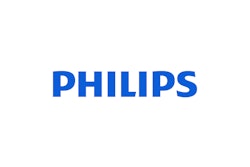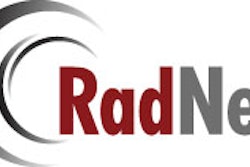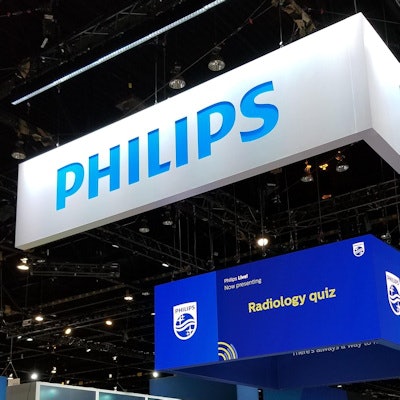
A centralized command center that enables healthcare enterprises to more easily manage their far-flung radiology operations is the focus of the virtual booth at RSNA 2020 for Philips Healthcare.
Called Radiology Operations Command Center (ROCC), the concept is intended to serve as a centralized hub that can improve communication between radiologists, administrators, radiologic technologists, and other personnel who are responsible for managing multiple imaging sites. Philips has developed software that enables users to maintain business continuity, improve radiology productivity across a healthcare enterprise, reduce issues related to image quality, and expand access to MRI and CT services.
ROCC users can create remote connections between scanners and it is compatible with older imaging devices. Users can set the operations center up in a hub-and-spoke network to connect their scanners across their enterprise, and ROCC can also be used for functions such as virtual imaging assistance, virtual on-demand cross-training, and remote adjustment of imaging protocols for greater standardization.
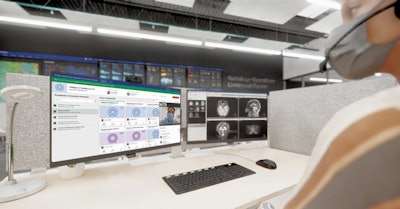 Radiology Operations Command Center (ROCC) is intended to serve as a centralized hub that can improve communication between radiology personnel. All Images courtesy of Philips.
Radiology Operations Command Center (ROCC) is intended to serve as a centralized hub that can improve communication between radiology personnel. All Images courtesy of Philips.Philips is shipping ROCC as a commercial product, and the company already has an installation up and running at a RadNet facility in the New York City area. With healthcare enterprises pursuing virtualization and trying to move imaging systems closer to the point of care, Philips sees ROCC as an attractive model.
ROCC is just one of a number of offerings that Philips is making available under its new Radiology Workflow Suite, also being introduced at the RSNA 2020 conference. The program bundles existing Philips products and services with new offerings like ROCC.
Offerings under the program cover the gamut of radiology workflow, including scheduling and patient preparation, image acquisition, image and data interpretation, and reporting and results communication. Radiology Workflow Suite is vendor-neutral and can work with products from any vendor, according to Philips.
In addition, Patient Management Solution is an application that sends patients reminders and other information about upcoming telehealth consults to help them prepare. Before in-person appointments, Patient Management Solution can help healthcare providers screen patients using a digital survey to identify possible COVID-19 symptoms.
In other healthcare IT news, Philips is working with IT consulting firm Enovation in the Netherlands to build a cross-enterprise document sharing network based on the XDS standard. The network will support the digital exchange of patient data across 80 hospitals in the Netherlands, the vendor said.
Philips is also pursuing other projects internationally, including the U.K. and U.S. In Denmark, Philips Clinical Collaboration Platform is supporting telehealth and other connectivity initiatives that serve 300 radiologists and nuclear medicine specialists and performing 1.5 million exams annually over a region of 1.2 million people.
The company noted that its teleradiology services business in the U.S. has experienced strong growth in 2020, which Philips attributes to an increase in capacity and remote imaging capabilities, including in relation to the COVID-19 pandemic.
Advanced visualization
In advanced visualization, Philips is launching the latest version of its Advanced Visualization Workspace, Intellispace Portal 12. The new iteration features new artificial intelligence (AI)-assisted tools for quantitative assessment and automatic results generation, as well as follow-up and communication with referring physicians.
New features include AI algorithms for detecting lung nodules, analyzing cardiac function, and quantifying pulmonary infiltrates that might be associated with COVID-19. The software includes applications that can work with images from multiple vendors and modalities and are applicable across cardiology, pulmonology, oncology, and neurology.
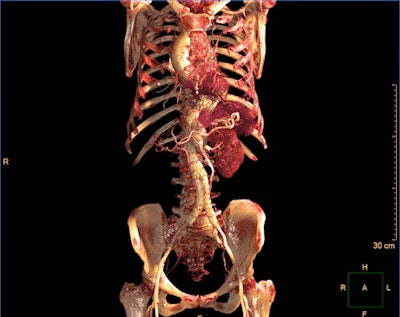 The new IntelliSpace Portal 12 version includes a photorealistic volume-rendering mode.
The new IntelliSpace Portal 12 version includes a photorealistic volume-rendering mode.In cardiology, for example, the new version includes tools for analysis of cardiac MR images that use AI support to segment the right and left ventricles, ensuring accurate volumetric and functional measurements. This enables the completion of a cardiac MRI scan in less than five minutes.
For pulmonology, Philips has developed CT Pulmo Auto Results, a set of AI algorithms that perform automated lung and lesion segmentation, as well as classification of ground-glass opacities. The company believes the tool can be used for patients with COVID-19.
CT ClearRead CAD lung nodule analysis is designed to detect and characterize nodule types and help radiologists avoid missed nodules, while for the brain, the CT Brain Perfusion Analysis tool running on IntelliSpace Portal 12 now supports automatic brain perfusion measurements available within the PACS, with an option to have results sent to a stroke patient's clinician quickly.
Finally, IntelliSpace Portal 12 also includes a photorealistic volume-rendering mode, as well as new developments for vascular analysis, automated lesion segmentation for longitudinal tumor tracking, myocardial strain quantification software, and automated capabilities for CT coronary analysis.
Ambient Experience
In other news, Philips announced that Phoenix Children's Hospital has installed a Vereos PET/CT scanner with the company's Ambient Experience concept. It has also installed Ambient Experience at two uptake rooms in the facility, where parents and children wait after injection of the PET radiopharmaceutical until enough tracer has accumulated for scanning.
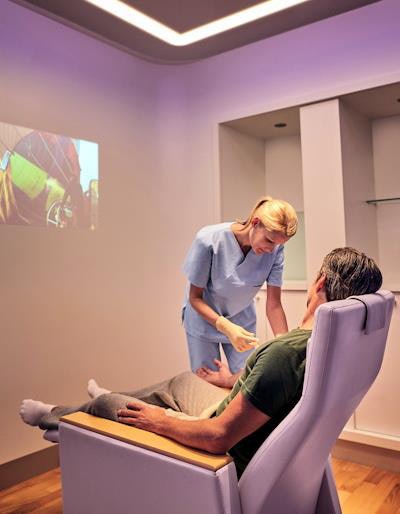 Philips has installed Ambient Experience at two PET radiopharmaceutical uptake rooms at Phoenix Children's Hospital.
Philips has installed Ambient Experience at two PET radiopharmaceutical uptake rooms at Phoenix Children's Hospital.This installation, along with another recent Ambient Experience installation at Hospital CUF Tejo in Lisbon, will bring Philips to close to 2,000 Ambient Experience installations worldwide.
Cybersecurity
Philips is also ramping up its activity in cybersecurity, introducing Philips Cybersecurity Services. The offering is a package of technologies and services that are designed to improve the safety of medical devices and software.
The offering is supported by a partnership Philips has formed with CyberMDX, a provider of medical device security and services.





